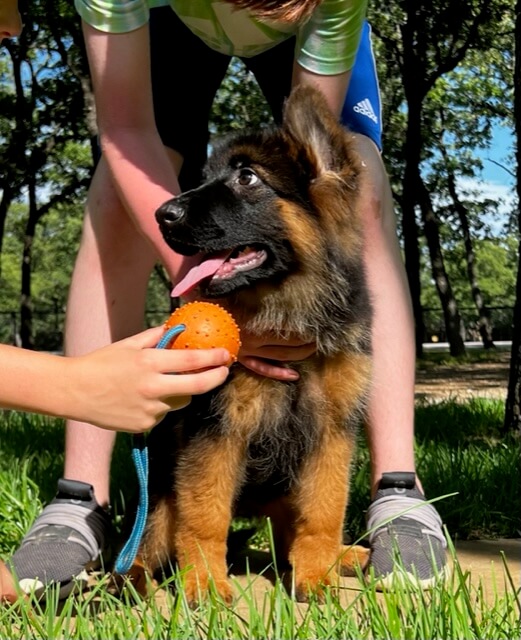
Bringing a new German Shepherd puppy into your home is a moment of pure joy. The promise of adventure, loyalty, and love looms large as those curious eyes meet yours for the first time. But with the boundless energy and intelligence of this breed also comes an inherent need for structure and training. Temperament training, particularly in the formative years, is akin to laying the foundation of a house. It is the bedrock on which future behaviors and responses are built, crucial for not just a well-mannered pet, but a balanced and happy companion.
German Shepherds are renowned for their versatility, known for excelling in various roles, from guide dogs to police K-9 units. Their trainable nature and keen instincts make them quick learners, which means the time and effort you invest in their early training can shape the canine they grow into. In this comprehensive guide, we’ll explore why temperament training is vital, provide you with invaluable tips, and help you troubleshoot common hurdles new owners often face.
Why Temperament Training Matters
Impact on Behavior and Socialization
The development of a pup’s temperament is multifaceted and begins the moment they open their eyes. In the first eight weeks of life, experiences mold the dog’s early interactions, laying the groundwork for how they respond to the world. The careful orchestration of positive experiences during this critical period ensures that adult German Shepherds are confident and well-adjusted.
Temperament training also influences how a dog interprets and reacts to stimuli. Early exposure to a variety of environments, people, and animals creates a relaxed and friendly demeanor, reducing the likelihood of fear-based aggression and other socialization problems.
Long-term benefits for the Dog and Owner Relationship
A well-tempered dog is a joy to be around, and the bond that forms between pet and owner through training is unbreakable. Establishing a framework for communication and understanding from an early age leads to a respectful and loving partnership.
The benefits extend to all aspects of the dog’s life, promoting better coping skills, adaptability, and stress management. It can mean the difference between a pet that’s a source of frustration and one that is truly a member of the family, an integral part of any activity or outing.
Tips for Effective Temperament Training
Start Early and Be Consistent
Consistency is key when teaching a young German Shepherd. A routine that includes feeding times, bathroom breaks, and training sessions provides the predictability and structure these highly intelligent dogs crave.
But training shouldn’t start at 6 months—it begins on day one. Use simple commands like ‘sit’ and ‘stay’ even when the pup is just learning to walk. Short, 5-10 minute sessions throughout the day reinforce learning without overwhelming the young mind.
Socialization with People and Other Animals
Positive socialization is perhaps the most critical aspect of temperament training. Proper exposure to a variety of people, different ages, and diverse environments foster a tolerant and sociable dog. Similarly, controlled interactions with other dogs teach appropriate play behaviors and help prevent aggression due to fear or dominance.
Use caution not to overwhelm your pup during socialization. Each interaction should be pleasant and end on a positive note, ensuring the pup does not become wary or frightened of new experiences.
Positive Reinforcement Techniques
German Shepherds, like all dogs, respond best to positive reinforcement. This means praising and rewarding good behaviors rather than punishing unwanted actions. Develop a clear and consistent marking word, such as ‘yes’ or ‘good,’ followed by a treat or toy.
Avoid yelling or physical punishment, as it can lead to anxiety or aggression. Instead, redirect undesirable behaviors and proactively reinforce alternatives. With their natural drive to work and please, German Shepherds will quickly catch on to what earns them praise.
Understanding Breed-Specific Traits
Recognizing the inherent traits of the breed is crucial when setting training goals. German Shepherds are protective by nature, so controlled exposure to new people and environments is especially important. They are also energetic and require ample physical and mental stimulation to prevent boredom and destructive behaviors.
Tailor your training to harness these traits positively. Engage your pup in agility courses, scent work, or advanced obedience classes to fulfill their need for challenge and activity. Adapting training to their preferences ensures they’re not just well-behaved but also fulfilled.
Common Challenges and How to Overcome Them
Patience and Perseverance
Training a puppy, especially a German Shepherd, is not without its challenges. The key is to remain patient and keep your cool. Understand that setbacks are a normal part of the process and that every dog learns at its own pace.
Consistency in your approach, even when it feels like your commands are falling on deaf ears, will eventually pay off. Always end on a positive note, focusing on the progress you’ve made rather than the distance still to go.
Seeking Professional Guidance When Needed
There’s no shame in seeking out a professional trainer, particularly if you’re a first-time owner. These experts can offer customized advice and strategies to address your dog’s specific needs, ensuring that you’re not reinforcing behaviors that could become problematic in the long run.
Group classes also provide valuable socialization opportunities while honing obedience skills. An investment in professional guidance is an investment in the lifelong happiness and well-being of your German Shepherd.
Looking For a German Shepherd Puppy?
In closing, the time and energy you invest in training your German Shepherd puppy do not go unrewarded. It is a labor of love that yields a companion who is not just well-behaved, but one who is confident, happy, and able to share in life’s adventures alongside you. It is an investment in the future, both of your dog and the relationship you share.
Contact us at Kaiser German Shepherds for breed-specific advice, to acquire your loving German Shepherd pup, or to attend our comprehensive training sessions. Your path to a harmonious life with your German Shepherd begins with a single step.








